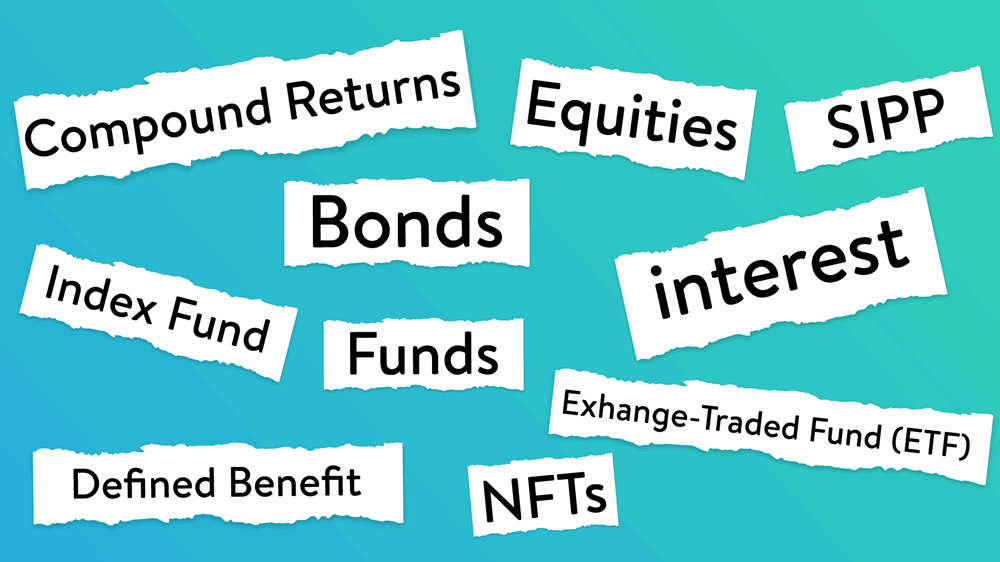Have you been put off from investing because you feel like you don’t know enough about it? Maybe you find that the language and terminology being used is just too confusing? If so, you're not the only one.
Back in 2021, we spoke to 1,000 UK savers about their money habits and found that there was a huge lack of confidence when it comes to investing. In fact, almost 3 in 4 (72%) admitted that they didn’t feel confident enough to try it.1
Although there are many reasons why people might not want to take the leap into investing, such as being worried about losing money, 38% of those surveyed said they didn’t understand how investing works, while a further 22% said that they found the language used ‘too confusing’.
At Wealthify, we aim to offer investing with simple, plain English that allows anyone to give it a go. We have a jargon-free policy, so if there‘s anything you don’t understand, we’ll change it going forward! We’re also working closely with influencers to make the world of investing easier to understand.
One set of influencers are Niaz and Shaq, who manage the popular online community Millennial Money and have worked with us on investment content over the past year. They are on a mission to help millennials (and Gen Z) better understand their money and feel more comfortable talking about it no matter their circumstances. As part of this, they surveyed their followers about their money confidence.2
Their results show that there’s still some work to be done, with investing jargon still being something that is confusing people and potentially hindering their likelihood to invest.
So, what did their research find?
Although more than half of those who responded to the polls are keen investors (with 66% saying they already invest), only 10% said they felt ‘very’ confident about it. 44% said that they felt ‘reasonably’ confident, while the remaining 46% said they were ‘not at all’ confident when it came to investing.
Investment jargon explained
When asked which investing and money related words or phrases confused them the most, ‘defined benefit’, SIPPs’, bonds’, and ‘interest’ were just some of the ones that were thrown out there. So, we’ve put together this jargon buster in case they leave you wracking your brain too.
Here are some of the terms that came out top in Millennial Money’s poll (as well as some others that can be confusing) and what they actually mean.
Interest: As a consumer, there are two types of interest: the interest you earn on your money when you save it in a bank or dedicated savings account, and the interest you’re charged for borrowing money, say for a mortgage. When you lend money to someone, they pay you interest on the money you’re lending them.
Compound Returns: This is when any profits from your investment are added back into your original investment and they could grow together, creating a snowball effect.
Bonds: When you buy a bond, you are lending money to a government or company. In return, they promise to try to pay you back the face-value of the bond at the maturity of the bond, and usually interest at a regular interval. Various bonds are available: Corporate bonds (which are issued by companies) and Government bonds, which are issued by governments (in the UK, these are called Gilts).
NFTs: NFTs (Non-Fungible Tokens) are a type of cryptographic asset (if you consider cryptocurrency as cash, for example, then cryptographics would be commodities). Each NFT has a unique identification code that's listed on a blockchain, which means it cannot be traded or exchanged for an identical product. This has made NFTs a very popular way for artists to sell their digital artwork - providing an 'original' which includes the unique identification code that sets it apart.
Equities: This is a simple one – it's just another name for shares.
Funds: A collection of investments, typically shares or bonds, that is managed by a fund manager who invests on your behalf.
Exchange-Traded Fund (ETF): A type of fund that is traded on an exchange such as the London Stock Exchange throughout the day.
Index Fund: These aim to track the returns of a designated stock market index, i.e., the FTSE 100 or S&P 500. The fund manager will do this by mirroring the index they’re following and investing a proportionate amount in the companies and organisations that make up that market to provide similar performance over time.
SIPP: A Self-Invested Personal Pension is a pension that allows the holder to choose how the pension is invested and pay into it as and when they want.
Defined Benefit: this relates to pension schemes where the amount you’re paid in retirement is calculated based on several factors, including length of employment and salary. The two types of defined benefit pension are final salary schemes and career average schemes.
Want to brush up on your investing knowledge even further? We’ve got you. Why not check out our investment glossary for more terms to impress your friends with?
- https://www.wealthify.com/blog/confidence-gap-what-is-stopping-brits-investing-in-their-future
- Results from 1,400 people responding to a series of polls run on Instagram in April 2022.
Please remember the value of your investments can go down as well as up, and you could get back less than invested. Wealthify doesn’t offer financial advice. Please seek financial advice if you’re unsure about investing.



